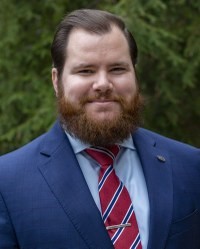Giving
A gift directed to the Rock Ethics Institute will help us continue to build our strong research initiatives and enhance our ability to provide faculty with the tools they need to make a significant impact in ethics education.
Thank you for considering a gift to the Rock Ethics Institute.
How to Make a Gift

Geoff Halberstadt, Senior Director of Development, will work closely and confidentially with you and your financial advisers to ensure that your gift achieves your individual goals and expresses your personal vision. You can contact Geoff by email at glh5028@psu.edu or by phone at 814-865-3173.
Option 1: Online Giving
Our secure site ensures that your credit card will be processed in a safe and protected environment. If you would prefer not to complete this process online, you may download a printable form.
Option 2: By Check
If you would like to make a gift to the Rock Ethics Institute by check, please make your check payable to The Pennsylvania State University and mail to the following address:
College of the Liberal Arts
Alumni Relations and Development
Attn: Geoff Halberstadt
The Pennsylvania State University
13 Sparks Building
University Park, PA 16802-5200
Our Sponsors
The Rock Ethics Institute was established in 2001 through a $5 million gift from Doug (Psychology, ‘68) and Julie Rock. In 2011 the Rocks endowed the Nancy Tuana Directorship of the Rock Ethics Institute with an additional $5 million gift.
The Charles (Chick) & Joan Rolling Program Fund in Engineering and Ethics: A Global Perspective, established by Chick and Joan Rolling in 2001, enriches Penn State’s College of the Liberal Arts and the College of Engineering by supporting interactive workshops and seminars that address ethical issues related to the practice of engineering, the integration of an ethics curriculum that is sensitive to global contexts, and the task of assessing the impact of the curriculum on students.
The Richard B. Lippin Lectureship in Ethics is made possible by support from Richard B. Lippin (Psychology, ’68) and the late Ronnie Lippin. The Lippin Lecture focuses on current ethical issues in the fields of business, medicine, science, and technology, as well as questions of justice. Richard Lippin established the lectureship with his late wife because he felt that much of the integrity and honesty that he knew growing up now seems lacking in the world of business. His company, the Los Angeles-based Lippin Group, does marketing consulting for the entertainment industry.
The Harold K. Schilling Memorial Lecture on Science, Technology, and Society focuses on the connection among ethics, science, technology, and the human condition. It honors the memory of Dr. Schilling—physicist, professor, and former dean of the Graduate School at Penn State.
Dr. Schilling was also president of the American Association of Physics Teachers (1948–49). His physics research included work on supersonic signaling for the Office of Scientific Research and Development during World War II, and in his later years, he turned to the connection between science and religion.
Professor Schilling’s 1958 lecture, Concerning the Nature of Science and Religion: A Study of Presuppositions is available here.
Sherwin Early Career Professorships are given to promising faculty in the College of the Liberal Arts at the beginning of their careers and include support for the faculty member’s research and teaching program. The professorship is a gift of Douglas and Joyce Sherwin.
Doug Sherwin, born in 1915, was a 1940 Penn State chemical engineering graduate and a varsity baseball player. Because his father lost all his money during the depression, Doug had to work his way through Penn State. He worked in the Corner Room and at a fraternity while in school.
During World War II, Doug worked as a civilian employee for the U.S. government, on loan from ConocoPhillips, and after, when he was in Berlin during the Berlin airlift, he met and married his wife, Joyce, a graduate of the University of Maryland. Later, he earned both a bachelor’s and master’s at Oxford University in philosophy, politics, and economics. He returned to ConocoPhillips until his retirement in 1983.
Even though Doug was in his late 80s when we connected with him, he loved coming back to campus with Joyce and taking part in the Rock Ethics Institute board meetings and other events. Here, you can read an article on ethics that he published in the Harvard Business Review in 1983.